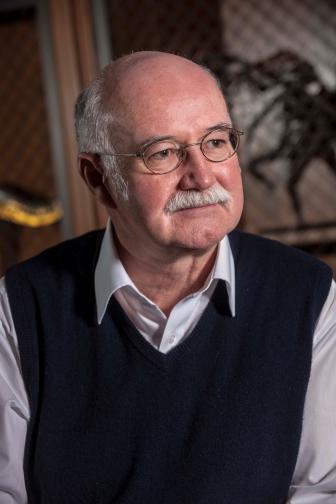Poet
Peter Fallon

Peter Fallon
(Germany, 1951)
Biography
Peter Fallon was born in Germany to Irish parents and moved to Ireland at the age of six. He was brought up on a farm in County Meath, a rural place that has been the locus and inspiration for many of his finest poems. He attended college in Dublin, a city then teeming with poets, musicians and would-be Beatniks. Out of this very international atmosphere came the first Dublin literature festival and the poetry-performance group Tara Telephone, through whom Fallon has his first ventures into publishing. Since he graduated from Trinity College Dublin in 1975, Fallon's life has been dedicated to poetry, publishing and farming – all three activities utterly consuming his waking hours.
The latter collection established Fallon's clear mature tone, a tone that is inextricably linked to rural life, to a transcendentalism of the soil. In the later collections he speaks of new love and of intensely interpersonal landscapes, gradually gleaning memories from the neighbourhood of the Lennoxbrook farm of his uncle and refining these memories with a viewpoint that is unashamedly modern, Dublinesque, Rathgar-toned. It is that mixture of a refined, preppy, educated sensibility working upon details of rural life (with its horse-shit and demotic speech) that gives Fallon’s poetry its distinct signature. In an Irish world that was dominated by the rural landscapes of the Nobel laureate Seamus Heaney, Fallon established his own imaginative territory, using almost the same material to examine matters as varyng as love, family, death, neighbourhood and husbandry. One of his most famous quatrains, from Winter Work, is a knowing self-parody:
. . . All I approve persists,
is here, at home. I think it exquisite
to stand in the yard, my feet on the ground,
in cowshit and horseshit and sheepshit.
It is telling that what he approves of is what persists ‘at home’. Farming, publishing and the occasional teaching – at Deerfield Academy, Boston College and Trinity College Dublin – consumed the poet's life in that long stretch of settling into middle-age, a moment brilliantly captured in what is surely his finest collection, The Company of Horses (2007). These were also the years when Fallon became spiritually close to the work of American poet Wendell Berry. Like Berry, Fallon knew rural life intimately. His day-by-day experience of farming prevented both romanticism and ennui from setting in. The poet’s refined antennae picked up many of the signals of ordinary Irish life around the farm; all of the folklore, betrayal, pregnancy and exile, the very struggle to be rural and fully humane, is captured in the marvellous and marvel-filled The Company of Horses:
. . . the ghosts of night
form silhouettes along the ridge,
a dun, two chestnuts
and a bay.
Here, literally, the company of horses – both working and sporting animals – is a deep consolation in life. In this collection, and at this point in his life, Fallon finds a redemptive power in the ‘shards and shatters’ of nature, in the delight of springtime and the rising aria of songbirds. To have ‘loved my term/ on earth’ is the powerful affirmation of ‘Night and Day’, the last poem in the volume. The lightness and idealism of his setting out in his early 20s, that international Whole Earth Catalog sense of belonging to earth, still persists in his work, but is deepened nowadays by wide reading and by life’s own experiences.
No portrait of Fallon would be complete without mentioning his influential editorial work for Gallery Press, as well as his work as an anthologist of various Irish poetries. The beautifully produced Sense of Ireland anthology of 1980, as well as The Penguin Book of Contemporary Irish Poetry (1990), edited with Derek Mahon, established Fallon as an arbiter of taste as well as a lead archaeologist of the layered communities in Irish poetry. Nor should we forget his great triumph as a translator: the Georgics of Virgil (Gallery Press, 2004, and Oxford World Classics, 2006). This work of genius, a work that places Fallon in a great Trinity College classical studies tradition, has been lavishly and justly praised. Not only has this poet been keeping the company of horses, but he has been shadowed, all the while, by ghosts from the wide Mincius as well as the river Boyne. Virgil’s words, in truth, might be a fitting epigraph to Fallon’s work:
A countryman cleaves earth with his crooked plough.
Such is the labour
of his life. So he sustains his native land . . .
© Thomas McCarthy
Bibliography Poetry
Winter Work, Gallery Press, Oldcastle, 1983
The News and Weather, Gallery Press, Oldcastle, 1987
Eye to Eye, Gallery Press, Oldcastle, 1993
News of the World: Selected and New Poems, Gallery Press, Oldcastle, 1998
The Georgics of Virgil, Gallery Press, Oldcastle, 2004
The Company of Horses, Gallery Press, Oldcastle, 2007
Strong, My Love, Gallery Press, Oldcastle, 2014
Links
Video of Fallon reading at Boston University
'A Brighter Blue' at the Poetry Project
Dennis O'Driscoll on Fallon at the Dublin Review of Books
Poems
Poems of Peter Fallon
Sponsors
























